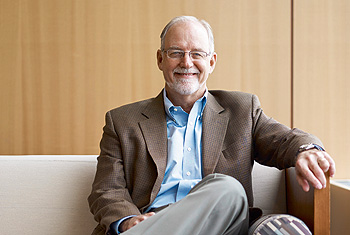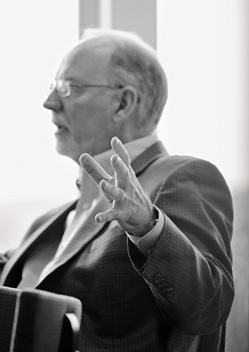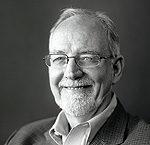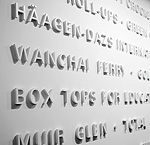“We know that leaders come in many different packages and it takes patience to identify them.”
Interview with Kendall J. Powell, Chairman and CEO, General Mills Inc.

As a branded company whose success depends on consumer trust, General Mills puts a premium on potential leaders with integrity, vision, and the will to win. From the vantage point of a lifelong career at the company, Chairman and CEO Kendall J. Powell talked with THE FOCUS about how the organization identifies, develops, and keeps them.
The Focus: In 2012, Forbes magazine cited General Mills as “the most reputable company in America,” partly for its work in leadership. It’s interesting that they would make a connection between reputation and leadership.
Kendall J. Powell: I think the connection is critical. Many years ago, we developed an approach to leadership that focuses on three distinct dimensions: individual leadership qualities, team-leadership effectiveness, and performance over time. Among individual leadership characteristics, personal integrity is absolutely crucial. Unless your guiding principle is to ‘do the right thing,’ you cannot create trust as a leader. It may seem self-evident, but to be a reputable company you must have reputable leaders of unquestioned integrity.
Beyond integrity, what do you see as the other important individual traits of a genuine leader?
The ability to maintain respectful relationships is an indispensable quality of good leadership. That means being able to listen to advice, being reflective, and being able to learn, adjust, and go forward. Emotional resilience matters too. You don’t win all the time. You’re going to fail on occasion, but you have to stay on an even keel and plow forward despite the disappointment. But individual leadership skills alone aren’t sufficient. The second dimension is team skills. At this company, we win as a team – there is no star system here. Some people are just very good at laying out a vision and being very clear about the path to get there. Part of team leadership is the ability to work across boundaries, to welcome diverse points of view, and to weave them into a superior solution.
The third dimension we try to build and nurture is a commitment to superior performance – what I would call the ‘will to win.’ Performance is really about whether you can ‘put points on the board’ – your contributions to the business over time. It requires determination, intense focus on the marketplace, and the ability to convert your good leadership qualities into results. We look at all three dimensions very carefully in evaluating people.
“You don’t win all the time. You’re going to fail on occasion, but you have to stay on an even keel and plow forward despite the disappointment.”

If you could magically improve your organization’s approach to any of those three dimensions, which one would it be?
The biggest career derailers tend to be deficits in individual leadership qualities like integrity, willingness to listen to advice, and resilience – the things that tell you who the person really is. The more you can know about those dimensions of a person’s character the better.
Aren’t those also the strongest indicators of potential? And because these deep personal traits are typically formed early in life it should be possible to identify them relatively early…
Yes, team leadership can be taught to some extent, and the ability to get results can be improved by working with mentors and successful people in the organization. But personal traits are deeply ingrained and difficult to shape. We have an HR development culture here – our people do an extraordinary job in that regard – but if there were even better ways to truly gauge individual qualities very early on, to really know a person from the outset, it would greatly benefit the individual as well as the organization.
As the world changes, are you finding that some attributes in your model of leadership which were previously less significant are becoming more important?
Two developments – the speed of business today and our company’s stronger international presence – have pushed a number of new attributes to the fore. In a world where everything is moving faster, leaders must be flexible and adaptable: they must be able to read trends more quickly, change on the fly, and act decisively. As we become more international, with more than half of our employees now outside the United States, we are looking for people who are also able to work effectively in other cultures. Expatriates are important – that’s a way you can move expertise around and build up your culture. But that’s not to say that expats are a universal panacea. For the most part, we are building local teams in the countries where we operate, but we do want people who are open to the developmental benefits of international experience.
How do you set about identifying the high potentials who may eventually be capable of filling the top leadership roles in your company?
We begin evaluating people from the moment they walk in the door – and we continually give them feedback, provide coaching, conduct regular and deep performance reviews, and plan their individual development with them. We monitor people each step of the way, and at a certain point in their careers we start making judgments, convening the people for whom they work, and considering each particular individual’s promise. It’s a group process of gauging the requisite personal leadership attributes – of gaining the conviction that someone has what it takes, that they possess the ability to lead teams effectively and that they can consistently produce results. We then give them appropriate stretch assignments and continue to evaluate them as they continue to grow.
With the retirement of the baby boomers well under way, many companies find themselves with a thin pipeline of talent to replace the outgoing generation. Given the talent squeeze, isn’t it essential not to overlook someone who, although not obviously a high potential, could become a great leader with the right development?
That is the beauty of a collaborative evaluation process that includes the appropriate network of interested parties across the organization. In a particular case, we may have five or six people who are thinking about succession, people from different functions and different roles who are all familiar with the individual we are evaluating. That is a very good way to ensure that we are surfacing people who might otherwise be overlooked. We also work to learn how the next level down is responding to the executive in question. And our continuing process of evaluation also ensures that people get multiple looks. We are oriented toward building careers – we know that leaders come in many different packages, and that it takes patience to identify them.
There is always the realistic possibility that a high-potential executive will fail in a stretch assignment. But failure can also demoralize people and set back their careers. How much room for failure should you allow?
Sometimes careers go sideways and sometimes they go backwards. It’s true that people sometimes stumble. As an organization, we are mature enough to recognize that and stay with people we believe in. High potentials in stretch assignments must be given the room to get their bearings and grow, and things won’t always go smoothly. But if, at the end of the day, their leadership is not clear and if their performance doesn’t materialize, then something is wrong.

People at headquarters may tend to favor the high potentials they are surrounded by, rather than the promising people in far-flung locations. How do you avoid this ‘soft bias’ in General Mills?
If you go into any General Mills company around the world, you will almost always see it being led by a local, with ninety-five percent of the leadership team composed of locals. We treasure people who know and understand our consumers and customers in each market, and it’s clear to everyone at headquarters that these are among our most important employees – very strong leaders with extremely high potential. Having significantly accelerated our global growth only relatively recently, compared to other major international companies, we are probably still in the early stages of the journey. But we all know that we absolutely must build local teams in all of the regions where we operate. And we certainly know that we have high-potential people all around the world.
Developing high potentials requires a significant investment of time and effort. What can you do to ensure that your investment doesn’t walk out the door just as it’s beginning to pay dividends?
We find that keeping people challenged over the course of their careers keeps them highly motivated to stay with us. It is hard to become one of the top five or six hundred leaders at General Mills – directors, officers, and division and functional business leaders. By the time an individual achieves that level, they have been carefully developed, thoughtfully supported and heavily scrutinized. And when they do get in they will find it highly rewarding, because we’ve paid a lot of attention to each one of them and to how we develop them and helped them grow as a leader. And because they know they are joining a strong leadership team at a company that consistently performs very well, we rarely lose them.
Grooming high potentials can be problematic. They may expect special treatment or more of the limelight. How do you reconcile focusing on individuals with your earlier statement that there is no star system at General Mills?
As people fulfill their potential they are promoted into positions of greater responsibility, which is intrinsically fulfilling professionally and they are rewarded commensurately. But, frankly, when they are at that leadership level, we don’t want it to be about them. We want it to be about General Mills and our values, about harnessing the power of their team, and about creating value for our shareholders.
As promising people rise in an organization, roles often become more comprehensive and may require a high tolerance for ambiguity and uncertainty as well as a need for decisiveness.
Yes, and it’s not only that roles get bigger. Organizations do too. As organizations grow and become more complex, people may have difficulty providing the right kind of vision and direction. As people make the jump to higher levels of responsibility, they may even feel a bit lost initially. We all grow up as operators, with our hands on the wheel, but as we move further and further away from that familiar experience, some can find it more challenging to figure out what we can do in our new role to make the most difference.
The biggest jump of all, of course, is to CEO. How do you and your board decide who might have the potential to make that long leap in General Mills one day?
Our board knows very well that succession planning is one of their most critical responsibilities. They get to know our senior leaders in depth over time, and I talk about succession with them several times a year. We have deep discussions about what the chief executive role requires, what the company will need, what we are doing to develop our top ten to fifteen leaders, and how they are progressing. It is a decision and an evaluation that plays out over time, so it is an ongoing conversation.
The role of the CEO has changed dramatically over recent years. Today it goes far beyond running a business to addressing the interests and pressures of all stakeholders. How do rising executives acquire experiences that help them learn about stakeholder management?
That is an excellent question. It’s an issue that has been further complicated by the desire of shareholders and stakeholders to have really independent boards. Twenty years ago, three or four members of a senior executive team likely also would have been on the board, which was, of course, a hugely valuable experience because they were able to hear the full board discussion. They really got to see things from the stakeholder point of view. Today, because that is less often the case, we absolutely encourage our senior leaders to hold seats on outside boards.
General Mills is noted for making volunteerism an integral part of leadership development. Do you encourage that kind of activity in order to develop specific leadership skills, or is the idea to raise consciousness among rising executives about the role of business in society?
I think it’s both. First, it’s a unique development opportunity. Large not-for-profit institutions have strategic issues, and General Mills leaders who serve on their boards or assist them in other roles get an important opportunity to analyze a different set of circumstances and help shape an organization. It’s an opportunity to test themselves, and not-for-profits have many of the same stakeholder management issues that commercial companies like ours also face.
Second, the role of business in society is changing. Citizens expect more, consumers expect more. Increasingly, they look at business and want to know if, in our pursuit of wealth creation, we are also doing the right thing. Is the food we are providing absolutely safe? Is it produced in a sustainable way? Are we genuinely engaged with the communities where our people live and work? General Mills is a branded consumer products company – everything we do is built on consumer trust. To build that trust, we must demonstrate in meaningful ways that we understand our impact beyond our prime mission of creating shareholder value.
In your own career, was there a moment or an experience that helped you determine the direction you should take to realize your potential?
In college, I thought I wanted to be a doctor. But I ended up working for a student-managed business called Harvard Student Agencies, a non-profit designed to give students hands-on business experience. We were publishing the Let’s Go travel guides and running charter airline flights. It was all very entrepreneurial and exciting. That was when – helped by my poor performance in organic chemistry – I realized that medical school may not be the best path for me and opted for business school instead. When I graduated, I wasn’t interested in consulting or banking, but in the kind of hands-on experience that I had known at Harvard Student Agencies. And that’s what General Mills offered.
In your 34-year career with the company, you have gone from marketing assistant to Chairman and CEO. Was there a particular role that was pivotal for you here?
I was sent to Lausanne, Switzerland, to help launch Cereal Partners Worldwide – General Mills’ joint venture with Nestlé. It was a pivotal experience, partly because it was international, but also because of the structure. We reported to a global board. We had factories all over the world, operated in a hundred markets, and had diverse and talented people everywhere, with a small management team at the center. It was a very testing experience. I had to consider how to best organize international operations, what works and what doesn’t work, and how to run a strategic business unit while getting the right level of autonomy in the markets. We made our share of mistakes. We were too centralized at the beginning, making decisions with and for markets that we should never have been making. But we thought we knew all the answers – so some of those experiences were painful. But they were learning experiences to be sure. Over time, we figured it out.
“While we are very much a ‘promote from within’ company, we are not averse to bringing in people from the outside if we don’t have the right level of talent internally.”

You once said that the downside to spending an entire career with one company is “having blind spots because you’ve always done it this way.” As a leader, how can you remain curious and open to new ideas?
It helps that our industry is going through a time of transformative change. How consumers get their information, how they behave, and what they expect – it’s all changing. So too is our company. As we continue to expand globally, we have to think differently about a great many things. While we are very much a ‘promote from within’ company, with a culture of talent development, we are not averse to bringing in people from the outside if we don’t have the right level of talent internally. Almost half of my senior team had the benefit of significant experience at other companies before they joined General Mills, from consulting firms to small entrepreneurial businesses to major food companies. Half of my senior team has also had significant international experience, which helps ensure real diversity of ideas around the table.
I had eleven years abroad travelling all over the world myself, gaining colleagues in many countries from many different backgrounds, finding my ideas constantly challenged. It’s an exhilarating experience and one of the most rewarding aspects of business. It’s a lesson I hope I relearn every day.

Ken Powell
Kendall J. Powell was born in Denver, Colorado, in 1954, graduated from Harvard in 1976 and earned an MBA from Stanford. He joined General Mills as a marketing assistant. Powell has spent more than a third of his career outside the USA and in 1990 helped launch Cereal Partners Worldwide (CPW) – the company’s joint venture with Nestlé based in Lausanne, Switzerland. After a further spell in the USA, not least as President of the General Mills Big G cereal division, he returned to Switzerland in 1999 as CEO of CPW and was instrumental in growing the joint venture into what is now a US$2 billion global cereal business. In 2006, Powell was elected President and COO of General Mills. He became CEO in September 2007 and Chairman in May 2008. Ken Powell serves on multiple boards.

General Mills
Starting with two flour mills in the 1860s, General Mills revolutionized the milling industry, producing flour with superior baking properties. In 1880, the company showcased its flours at the 1st International Millers’ Exhibition in Cincinnati, Ohio, winning gold, silver and bronze medals. The company duly renamed its finest flour Gold Medal – to this day the No. 1 flour brand in America. Headquartered in Minneapolis, Minnesota, General Mills is one of the world’s largest food companies, ranking 169th in the 2013 Fortune 500 and marketing its goods in over 100 countries. Roughly half of its 39,000 employees work outside the USA. Among the top General Mills brands are Betty Crocker, Cheerios, Green Giant, Häagen-Dazs, Jus Rol, Liberté, Pillsbury, Wanchai Ferry, Yoki, and Yoplait. Net sales for fiscal 2013 totaled US$17.8 billion.
PHOTOS: JÜRGEN FRANK





